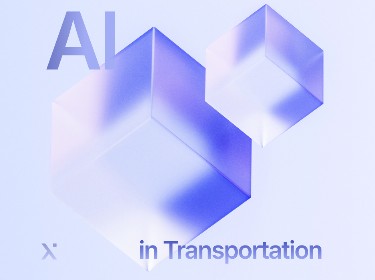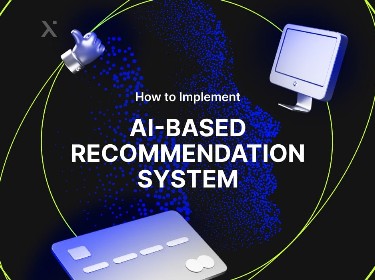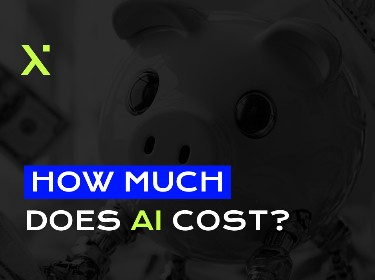With data as the driving force, AI has become a game-changer that is reshaping industries worldwide. But how can a business harness the power of AI digital transformation for growth and success?
The AI industry is expected to grow significantly in the coming years, reaching an estimated value of $305.9 billion by the end of 2024.
From automating mundane tasks to providing personalized experiences, AI is being leveraged in countless ways. For example, in the healthcare sector, AI-powered diagnostic tools are assisting doctors in detecting diseases earlier and more accurately. In the financial industry, AI algorithms are used to detect fraud, optimize trading strategies, and offer personalized financial advice.
In this article, our AI development team will explore the various ways in which AI can drive digital transformation and help you stay ahead of the competition. We will delve into specific use cases, discuss the challenges and opportunities associated with AI adoption, and provide practical tips for implementing AI solutions in your company.
Key business processes where AI can be implemented
Process automation
One of the most significant applications of AI digital transformation lies in process automation. By automating repetitive and time-consuming tasks, businesses can improve efficiency, reduce costs, and free up employees to focus on higher-value activities. For instance, AI-powered chatbots can handle customer inquiries, freeing up human agents to address more complex issues.
Analytics and forecasting
AI’s predictive capabilities enable businesses to anticipate future trends and make data-driven decisions. By analyzing historical data and identifying patterns, AI algorithms can forecast customer behavior, market trends, and potential risks. This AI digital transformation can be used to optimize inventory management, personalize marketing campaigns, and mitigate financial losses.
Customer experience enhancement
AI is transforming the way businesses interact with their customers. By analyzing customer data, AI-powered systems can personalize recommendations, provide tailored support, and create more engaging experiences, increase customer satisfaction, loyalty, and revenue.
A study by Salesforce found that 65% of customers expect companies to anticipate clients’ needs. This way, AI-driven recommendation engines learned to suggest products or services based on a customer’s past purchases and preferences.
Is AI racist? Read in our new article about major AI bias examples (ageism, sexism, racism, and more)
Decision-making
AI can augment human decision-making by providing valuable insights and recommendations. By analyzing complex data sets, AI algorithms can identify trends, assess risks, and identify opportunities that may be overlooked by human analysts. For instance, AI-powered tools can help financial institutions assess creditworthiness and optimize investment strategies.
Fraud detection and prevention
AI is playing a crucial role in combating fraud and protecting sensitive information. Through the power of AI and digital transformation, by analyzing patterns of fraudulent activity, AI algorithms can identify anomalies and flag suspicious transactions.
For example, AI-powered systems can detect credit card fraud by identifying unusual spending patterns or unauthorized access. A study by Juniper Research discovered that AI-enabled financial fraud detection and prevention platforms spending is projected to exceed $10 billion globally by 2027, from $2.7 billion in 2022. This represents a growth of 285%.
How AI enables digital transformation across industries
![]()
Healthcare
AI is revolutionizing patient care and diagnostics. Machine learning algorithms can analyze medical images, such as X-rays and MRIs, to detect diseases at an earlier stage. A study published in the journal Nature Communications found that deep learning models could accurately detect breast cancer from mammograms, even in challenging cases.
Personalized medicine is another area where AI is making a significant impact. By analyzing genetic data and patient histories, AI can tailor treatment plans to individual patients, improving outcomes and reducing side effects.
Finance
The financial industry has been a pioneer in adopting AI technologies. One of the most prominent applications is fraud detection. AI algorithms can analyze transaction data in real-time to identify suspicious patterns and prevent fraudulent activities. According to a recent study, AI systems can improve fraud detection accuracy by more than 50% compared to traditional methods.
AI is also transforming customer service in the financial sector. Chatbots and virtual assistants powered by AI can provide instant support to customers, answer their queries, and even assist with simple transactions. This has led to improved customer satisfaction and reduced operational costs.
Take a look at our exhaustive guide to machine learning fraud detection
Logistics
AI can optimize transportation routes, improving supply chain management, and enhancing warehouse operations. Predictive analytics can forecast demand, optimize inventory levels, and minimize transportation costs. Furthermore, AI-enabled robots are automating tasks such as picking and packing, increasing efficiency and reducing labor costs.
Retail
In the retail industry, AI and digital transformation has enabled recommendation engines to analyze customer purchase history and preferences to suggest personalized products, increasing sales and customer satisfaction.
AI can also be used to optimize inventory management by predicting demand and preventing stockouts or overstocking. Additionally, computer vision technologies can analyze customer behavior in stores to gain insights into their preferences and improve store layouts.
Check out our recent case – hypermarket warehouse automation with Digital Twins
Software development
Automated code generation tools can speed up development time and reduce errors. AI in digital transformation has also enabled AI-powered bug prediction and prevention tools that can help developers identify potential issues early in the development cycle, improving software quality.
Furthermore, AI can be used to optimize project management, improving collaboration and resource allocation. For example, AI-powered tools can analyze project data to identify bottlenecks and suggest improvements.
Energy
Intelligent energy grids, driven by AI technology, are rapidly becoming the standard. These systems can anticipate energy demand, optimize power distribution, and even identify potential outages before they happen. By analyzing data from countless sensors, AI helps ensure a stable and reliable energy supply. According to the International Energy Agency, AI could potentially decrease global electricity consumption by as much as 10%.
Key AI components that drive digital transformation
![]()
By understanding the key AI components and their applications, organizations can harness the full potential of this technology to gain a competitive edge.
ML: the foundation of AI
Machine Learning is a subset of AI that enables systems to learn from data and improve their performance over time. It involves algorithms that can identify patterns, make predictions, and automate tasks without explicit programming. There are two primary types of ML:
- Supervised learning: Involves training models on labeled data to predict outcomes for new, unseen data. Examples include classification (e.g., spam detection) and regression (e.g., predicting house prices).
- Unsupervised learning: Involves training models on unlabeled data to find patterns and structures within the data. Examples include clustering (e.g., grouping customers by behavior) and dimensionality reduction (e.g., simplifying complex data).
Computer vision
Computer vision is a field of AI that focuses on enabling computers to understand and interpret visual information from the real world. It involves techniques like image recognition, object detection, and image segmentation. Computer vision enables AI digital transformation through:
- Autonomous vehicles: Self-driving cars rely on computer vision to perceive their surroundings, detect obstacles, and make decisions.
- Facial and speech recognition: This technology is used for security, access control, and social media applications.
- Medical image analysis: Computer vision can assist in diagnosing diseases by analyzing X-rays, MRIs, and other medical images.
Robotic Process Automation (RPA)
RPA is a technology that automates repetitive, rule-based tasks, freeing up human workers to focus on more strategic activities. RPA systems can interact with applications, extract data, and trigger responses. Common RPA applications include:
- Data entry: Automating data entry tasks can reduce errors and improve efficiency.
- Invoice processing: RPA can automate the processing of invoices, reducing manual labor and improving accuracy.
- Customer onboarding: Automating customer onboarding processes can streamline the process and improve customer satisfaction.
Turn to our machine learning consulting and development team to start working on your own transformative ML-powered application
Predictive analytics
Predictive analytics technology uses statistical models and machine learning techniques to predict future trends and outcomes. This technology is a crucial component of AI in digital transformation, helping businesses make data-driven decisions and identify potential risks or opportunities. Applications of predictive analytics include:
- Customer churn prediction: Identifying customers at risk of leaving can help businesses retain them through targeted marketing efforts.
- Demand forecasting: Predicting future demand for products or services can optimize inventory management and production planning.
- Risk management: Predictive models can identify patterns of fraudulent activity and prevent losses.
Natural Language Processing (NLP)
NLP is a branch of AI that focuses on enabling computers to understand and generate human language. NLP techniques are used in applications like:
- Machine translation: Translating text from one language to another.
- Sentiment analysis: Determining the sentiment expressed in text (e.g., positive, negative, neutral).
- Chatbots and virtual assistants: NLP powers conversational agents that can interact with users in a natural language.
What are AI agents? Key types, examples, and benefits – explore in our new article
Future of AI in digital transformation
![]()
The synergy between AI and digital transformation is shaping the future. With applications like autonomous vehicles and personalized medicine, AI is at the forefront of this technological revolution.
However, the successful implementation of AI requires careful consideration and planning. Businesses must invest in the right talent and technology to harness the power of AI effectively. A reputable AI development company, like PixelPlex, can provide the expertise and guidance needed to bring AI visions to life.
The future of AI is bright, but it’s also filled with uncertainty. By embracing AI and addressing its challenges, we can unlock its immense potential to create a better world for all.
Drop us a line to discuss your project vision and get started!




